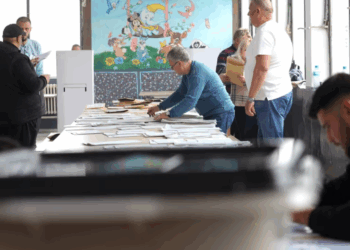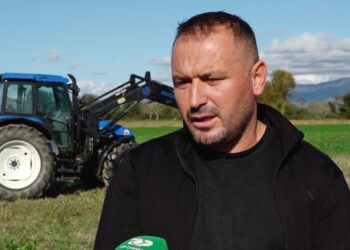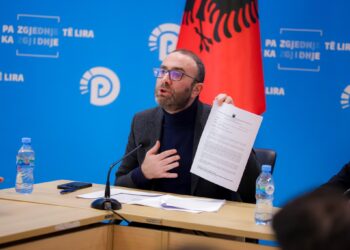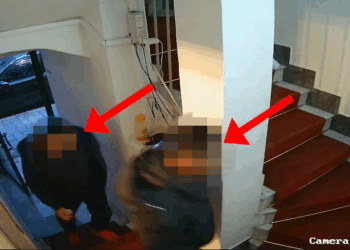Although the government and recyclers claim that the waste industry is on the verge of bankruptcy due to a 3-year import ban, the balance sheets of the Ricocing Association member companies show that their business has increased in volume over the past few years, while none of them that it is in great financial difficulty or on the brink of bankruptcy.
The new law permitting the import of waste, approved with the votes of Prime Minister Edi Rama’s center-left government, is based on a simple premise that the ban on the import of recyclable materials in 2013 is driving the recycling industry to bankruptcy, endangering the jobs it has created and the ability to recycle waste produced locally.
But unlike the government’s claim, the financial records of the recycling industry analyzed by BIRN show that not only this sector is not on the verge of bankruptcy, but it has also registered an increase since the ban on the import of waste from outside three years first.
The balance sheets of the Recycling Association member companies, the association that demanded the change of law and the permitting of the import of waste, published by the National Registration Center, show that their business has been growing over the last few years despite the import blockade, while none of the these companies do not seem to be on the verge of bankruptcy.
At the same time, the claim of the government and MPs for the huge investments of this industry seems not supported by the official balance sheets of these companies.
The law on import of waste is strongly opposed by civil society and environmental groups, which are afraid that with the permission of import in the country will enter hazardous waste with the help of criminal organizations that have the potential to turn Albania into Europe’s garbage basket.
The government rejects the allegations of environmentalists and activists, underlining that it has significantly improved law and customs controls since the ban on the import of waste three years ago, and challenging what they think differently by anathematizing as “charlatans.”
But when BIRN addressed concrete questions to the government on the basis of its hundreds of millions of euro investment made by the recycling industry, and the conclusion that the constituent companies of the sector are faced with major financial difficulties, Prime Minister Edi Rama did not respond.
The figure cacophony
BIRN analyzed the balance sheets of most of the members of the Recycling Association, listed on the ara.org.al official website, and pooled their financial data for 2010-2015 to deal with balance sheets with government claims has stated in many cases that the law permitting the import of waste is indispensable to rescue the recycling industry from bankruptcy.
The report of the law “On some amendments to law no. 10,465 “Integrated Waste Management”, published in the Parliament’s official website, suggests that investments in the “recycling industry account for about 120 million euros” and that in this sector there are over 35,000 employees employed. (Link Relationship).
Prime Minister Edi Rama went further when he stated on the official website of the Prime Minister that “273 million Euros have been invested in this sector” and that there are employed 3173 insured employees and 30 thousand more indirectly employed.
MP Eduart Shalsi and Prime Minister Edi Rama have repeatedly stated that the law that permits the import of waste is a measure that saves the industry from recycling and has argued that according to them, this industry is constantly at risk of bankruptcy.
“We are very aware of the necessity of this step we have thrown in. It would be fatal to happen what we started to see, bankruptcy of companies or their shift to other countries, “Rama declared on September 26, while citizens were preparing for protest against the verdict.
The Recyclers Association lists 16 companies as members on its official website, companies that represent a smaller number of businessmen, who are presented in association with more than one company. BIRN found at QKR the balances of 10 of these companies, including the largest sector companies, Edipack and Everest.
The balance sheets of these ten companies, their total assets in 2015, were ALL 5.2 billion (EUR 37.8 million), which is far from the prime figure claimed by the Prime Minister for investments worth EUR 273 million, and is also far from the claim of the relation of the law protected by MP Eduart Shalsi for investments amounting to 120 million euros.
Albania decided to stop importing waste for recycling purposes in October 2013, as the new left-wing government implemented its main electoral promise. The previous government had allowed the import into the 2011 law, granting import licenses for a number of companies. But despite the fact that the import of waste was blocked at the end of 2013, the turnover of the companies operating in this sector did not decline. Rather, the turnover grew.
In 2013, when waste import was allowed, the ten companies whose balance sheets were found at NRC had a combined turnover of ALL 2.6 billion, while in 2014, when import ban came into force, turnover rose to All 2.8 billion in 2015 and further increased to All 3.2 billion. Compared to 2010, when the total turnover was 2.1 billion, the turnover increased by 54 percent. The total turnover of the market is likely to be bigger than this because only 10 major companies are involved here.
The import permit in 2011 and its ban on 2013 does not seem to have caused either any increase or any extraordinary reduction on the lap of this sector. The net earnings declared by the companies analyzed were fluctuating, from Lek 77.9 million in 2010 to Lek 30.1 million in 2015, while peaked in 2012 with Lek 172.5 million.
Edipack, the leading recycling sector company, which produces cardboard packaging, steadily increased its turnover from Lek 158 million in 2010 to Lek 376.1 million in 2015. The other major company, Everest IE, visited pompously, increased its turnover from 183 million ALL in 2010 to ALL 346.9 million in 2015.
Among other companies, from a small number that have recorded losses on different occasions, the balance sheets show no evidence that the ban on the import of waste in 2013 has caused major distortions in the recycling market.
Waste economics
The vast majority of the garbage or garbage that Albania produces currently end up in the landfill, burn in open skies or jump wherever they can regardless of whether they are recoverable or not.
Statistics on waste produced, waste or recycled are doubtful. The Institute of Statistics produces annual reports based on data supplied on the basis of a survey, but the data are not entirely reliable.
According to these data, the production of typical household waste per capita during 2015 was 396 kilograms. The problem is that across the country, it is not clear how these statistics are produced and weigh the waste. In many landfills there are no scales and experts with whom BIRN spoke, said in terms of anonymity that there is reason to suspect that the lack of scales in the landfill serves to not properly measure the real weight of waste removed from the companies contracted for this service from the municipalities.
Currently, Albania recycles only a fraction of the considerable commercial value residues, which are plastics of various types and metals. Poor recyclers, generally from the Roma community, are paid 30 to 40 Lek per kilogram of plastic or iron while the paper is paid much cheaper, at the rate of 8-10 leks per kilogram and, consequently, is less recycled.
INSTAT estimates that Albania’s recycled waste recycled 25 percent in 2015, 22 percent in 2014 and 24 percent in 2013. If it is allowed to import recycled waste as a raw material from abroad, of recycling companies to accumulate the waste that Albania now produces will depend on the prices with which this industry will be able to purchase waste in other countries and the cost of transport.
Glass, a waste that accounts for a large part of the total waste volume, is currently not recycled because Albania has no glass factory while the import price is very low. Other wastes such as electronic devices or batteries simply end up in the landfill.
At present, over 40 percent of Albania’s population is not served with waste removal services. The government has not expressed any concern or any plan to change this reality. Reporter.al














